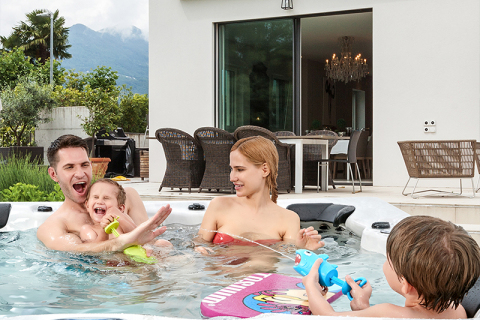
- Home
- >
News
A spa hot tub with a seat provides a natural sitting position. Compared to designs without a seat, which require full reclining or partial reclining, a spa hot tub with a seat reduces the user's effort and eliminates the need to constantly support their weight with their hands.
The data shows that the primary market for spa hot tubs is concentrated in developed countries or regions with high spending power and a high concentration of single-family homes. While the US's 1.8% may not seem high, considering its population of approximately 330 million, this means approximately 5.94 million people own a spa hot tub.
The hot water in a whirlpool hot tub causes the body to excrete large amounts of water through sweat. Prolonged soaking can lead to severe dehydration. Dehydration can cause a number of health problems, including dizziness, fatigue, and a rapid heartbeat.
When adding chemical shock agents directly to a whirlpool spa hot tub, if the water is stagnant, the concentration of the chemical can be excessively high in certain areas, leading to corrosion of the tub, discoloration of the materials, and the release of irritating gases into the air. The strong water flow and bubble agitation created by operating an aerator can:
"Air Lock" When filling a spa hot tub, air can easily become trapped in the water pipes or pump chamber, especially when refilling after completely draining the tub. If the air isn't completely expelled, it forms an "air pocket" that blocks the water flow path, preventing water from reaching the showerheads even when the pump is turned on.
Installing a spa hot tub is not inherently risky, but the following factors significantly increase the likelihood of premium increases: 1. Potential risk of personal injury 2. Fire or electrical failure 3. Structural damage due to leaks 4. Inadequate safety features
Freestanding outdoor hot tubs are designed to account for heat loss in the outdoor environment. They typically utilize multiple layers of insulation, advanced heating systems, and tightly sealed tub covers to ensure a stable water temperature.
1. Under standard operating conditions, high-quality acrylic spa hot tubs generally will not experience structural failure within 10 years; 2. Mid-range products may develop cracks or structural fatigue after 5 to 8 years; 3. If improperly installed or used, low-end tubs may break after 3 to 5 years; 4. Proper maintenance and repair can delay breakage by at least 3 to 5 years.
It is important to emphasize that as long as the user takes appropriate precautions such as freeze protection, drainage, and insulation, acrylic spa hot tubs can be used safely in cold environments. Therefore, the key isn't whether the acrylic spa hot tub itself is "cold-proof," but rather whether the user possesses the correct operating and maintenance procedures.
Neutral Cleaner (pH approximately 7) This is the preferred type of cleaner recommended for acrylic spa hot tubs. It is gentle, non-corrosive, and provides optimal surface protection. Common ingredients include mild surfactants, citric acid, and plant extracts.
For example, some studies suggest that a 30-minute soak in hot water may burn 50 to 100 calories, while a 30-minute run or swim can burn approximately 300 to 500 calories. Clearly, the direct contribution of a whirlpool spa hot tub to fat burning is minimal.
If the showerheads of outdoor whirlpool hot tubs are not cleaned regularly, over time, dirt, grease, and other impurities can accumulate inside the showerheads. These contaminants can easily lead to clogging.












